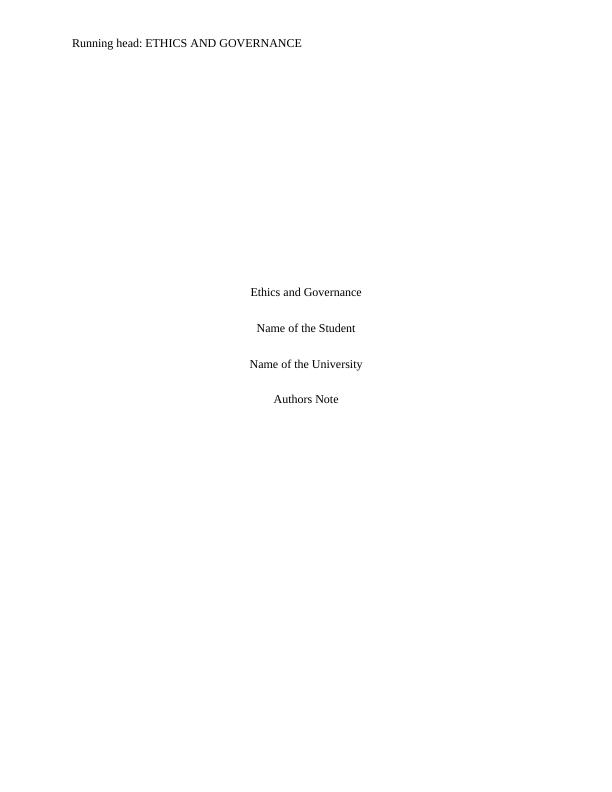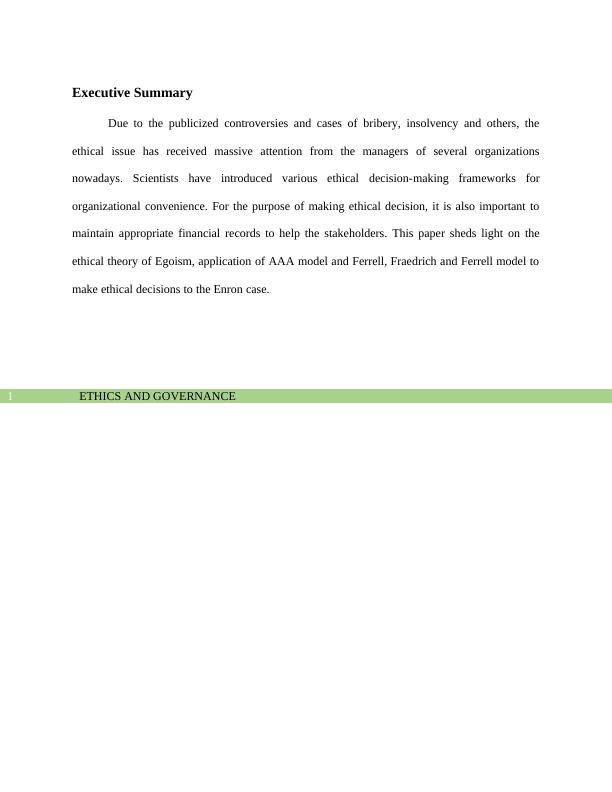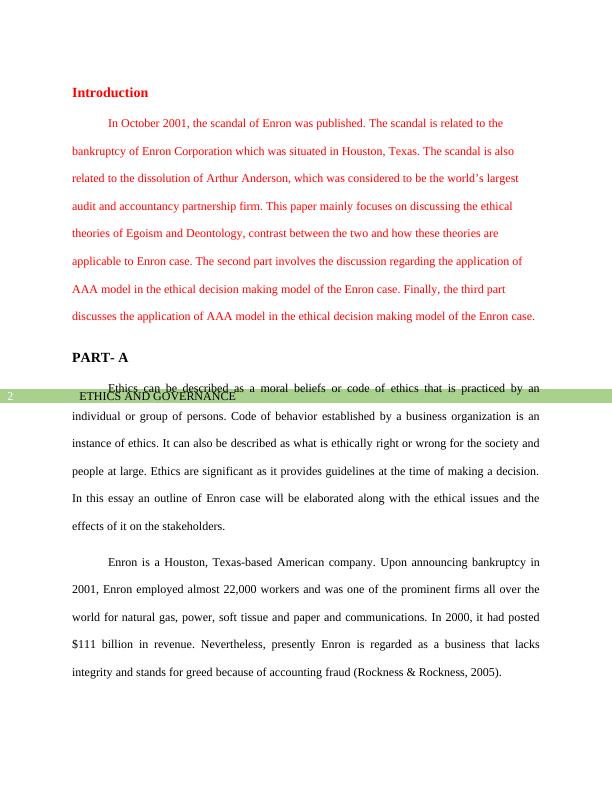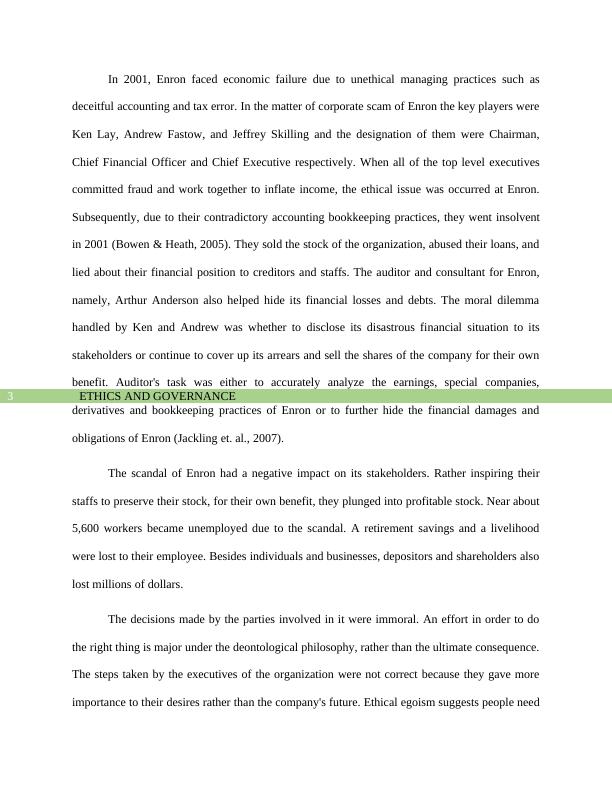Ethics and Governance - Scandal of Enron
Added on 2022-09-07
17 Pages4220 Words18 Views
Running head: ETHICS AND GOVERNANCE
Ethics and Governance
Name of the Student
Name of the University
Authors Note
Ethics and Governance
Name of the Student
Name of the University
Authors Note

ETHICS AND GOVERNANCE1
Executive Summary
Due to the publicized controversies and cases of bribery, insolvency and others, the
ethical issue has received massive attention from the managers of several organizations
nowadays. Scientists have introduced various ethical decision-making frameworks for
organizational convenience. For the purpose of making ethical decision, it is also important to
maintain appropriate financial records to help the stakeholders. This paper sheds light on the
ethical theory of Egoism, application of AAA model and Ferrell, Fraedrich and Ferrell model to
make ethical decisions to the Enron case.
Executive Summary
Due to the publicized controversies and cases of bribery, insolvency and others, the
ethical issue has received massive attention from the managers of several organizations
nowadays. Scientists have introduced various ethical decision-making frameworks for
organizational convenience. For the purpose of making ethical decision, it is also important to
maintain appropriate financial records to help the stakeholders. This paper sheds light on the
ethical theory of Egoism, application of AAA model and Ferrell, Fraedrich and Ferrell model to
make ethical decisions to the Enron case.

ETHICS AND GOVERNANCE2
Introduction
In October 2001, the scandal of Enron was published. The scandal is related to the
bankruptcy of Enron Corporation which was situated in Houston, Texas. The scandal is also
related to the dissolution of Arthur Anderson, which was considered to be the world’s largest
audit and accountancy partnership firm. This paper mainly focuses on discussing the ethical
theories of Egoism and Deontology, contrast between the two and how these theories are
applicable to Enron case. The second part involves the discussion regarding the application of
AAA model in the ethical decision making model of the Enron case. Finally, the third part
discusses the application of AAA model in the ethical decision making model of the Enron case.
PART- A
Ethics can be described as a moral beliefs or code of ethics that is practiced by an
individual or group of persons. Code of behavior established by a business organization is an
instance of ethics. It can also be described as what is ethically right or wrong for the society and
people at large. Ethics are significant as it provides guidelines at the time of making a decision.
In this essay an outline of Enron case will be elaborated along with the ethical issues and the
effects of it on the stakeholders.
Enron is a Houston, Texas-based American company. Upon announcing bankruptcy in
2001, Enron employed almost 22,000 workers and was one of the prominent firms all over the
world for natural gas, power, soft tissue and paper and communications. In 2000, it had posted
$111 billion in revenue. Nevertheless, presently Enron is regarded as a business that lacks
integrity and stands for greed because of accounting fraud (Rockness & Rockness, 2005).
Introduction
In October 2001, the scandal of Enron was published. The scandal is related to the
bankruptcy of Enron Corporation which was situated in Houston, Texas. The scandal is also
related to the dissolution of Arthur Anderson, which was considered to be the world’s largest
audit and accountancy partnership firm. This paper mainly focuses on discussing the ethical
theories of Egoism and Deontology, contrast between the two and how these theories are
applicable to Enron case. The second part involves the discussion regarding the application of
AAA model in the ethical decision making model of the Enron case. Finally, the third part
discusses the application of AAA model in the ethical decision making model of the Enron case.
PART- A
Ethics can be described as a moral beliefs or code of ethics that is practiced by an
individual or group of persons. Code of behavior established by a business organization is an
instance of ethics. It can also be described as what is ethically right or wrong for the society and
people at large. Ethics are significant as it provides guidelines at the time of making a decision.
In this essay an outline of Enron case will be elaborated along with the ethical issues and the
effects of it on the stakeholders.
Enron is a Houston, Texas-based American company. Upon announcing bankruptcy in
2001, Enron employed almost 22,000 workers and was one of the prominent firms all over the
world for natural gas, power, soft tissue and paper and communications. In 2000, it had posted
$111 billion in revenue. Nevertheless, presently Enron is regarded as a business that lacks
integrity and stands for greed because of accounting fraud (Rockness & Rockness, 2005).

ETHICS AND GOVERNANCE3
In 2001, Enron faced economic failure due to unethical managing practices such as
deceitful accounting and tax error. In the matter of corporate scam of Enron the key players were
Ken Lay, Andrew Fastow, and Jeffrey Skilling and the designation of them were Chairman,
Chief Financial Officer and Chief Executive respectively. When all of the top level executives
committed fraud and work together to inflate income, the ethical issue was occurred at Enron.
Subsequently, due to their contradictory accounting bookkeeping practices, they went insolvent
in 2001 (Bowen & Heath, 2005). They sold the stock of the organization, abused their loans, and
lied about their financial position to creditors and staffs. The auditor and consultant for Enron,
namely, Arthur Anderson also helped hide its financial losses and debts. The moral dilemma
handled by Ken and Andrew was whether to disclose its disastrous financial situation to its
stakeholders or continue to cover up its arrears and sell the shares of the company for their own
benefit. Auditor's task was either to accurately analyze the earnings, special companies,
derivatives and bookkeeping practices of Enron or to further hide the financial damages and
obligations of Enron (Jackling et. al., 2007).
The scandal of Enron had a negative impact on its stakeholders. Rather inspiring their
staffs to preserve their stock, for their own benefit, they plunged into profitable stock. Near about
5,600 workers became unemployed due to the scandal. A retirement savings and a livelihood
were lost to their employee. Besides individuals and businesses, depositors and shareholders also
lost millions of dollars.
The decisions made by the parties involved in it were immoral. An effort in order to do
the right thing is major under the deontological philosophy, rather than the ultimate consequence.
The steps taken by the executives of the organization were not correct because they gave more
importance to their desires rather than the company's future. Ethical egoism suggests people need
In 2001, Enron faced economic failure due to unethical managing practices such as
deceitful accounting and tax error. In the matter of corporate scam of Enron the key players were
Ken Lay, Andrew Fastow, and Jeffrey Skilling and the designation of them were Chairman,
Chief Financial Officer and Chief Executive respectively. When all of the top level executives
committed fraud and work together to inflate income, the ethical issue was occurred at Enron.
Subsequently, due to their contradictory accounting bookkeeping practices, they went insolvent
in 2001 (Bowen & Heath, 2005). They sold the stock of the organization, abused their loans, and
lied about their financial position to creditors and staffs. The auditor and consultant for Enron,
namely, Arthur Anderson also helped hide its financial losses and debts. The moral dilemma
handled by Ken and Andrew was whether to disclose its disastrous financial situation to its
stakeholders or continue to cover up its arrears and sell the shares of the company for their own
benefit. Auditor's task was either to accurately analyze the earnings, special companies,
derivatives and bookkeeping practices of Enron or to further hide the financial damages and
obligations of Enron (Jackling et. al., 2007).
The scandal of Enron had a negative impact on its stakeholders. Rather inspiring their
staffs to preserve their stock, for their own benefit, they plunged into profitable stock. Near about
5,600 workers became unemployed due to the scandal. A retirement savings and a livelihood
were lost to their employee. Besides individuals and businesses, depositors and shareholders also
lost millions of dollars.
The decisions made by the parties involved in it were immoral. An effort in order to do
the right thing is major under the deontological philosophy, rather than the ultimate consequence.
The steps taken by the executives of the organization were not correct because they gave more
importance to their desires rather than the company's future. Ethical egoism suggests people need

End of preview
Want to access all the pages? Upload your documents or become a member.
Related Documents
Governance, ethics and integrity -lg...
|15
|3772
|15
Corporate Governance and Ethics - Enron Corporationlg...
|15
|3622
|22
Enron Ethics (Culture Matters More than Codes)lg...
|15
|3686
|19
Ethics and Governance | Enron Corporation Studylg...
|16
|3786
|34
Auditing Theory and Practice: Enron and HIH Insurance Scandalslg...
|15
|3403
|357
The Fall of Enron-An Analysis of Ethical Issueslg...
|14
|3452
|31
